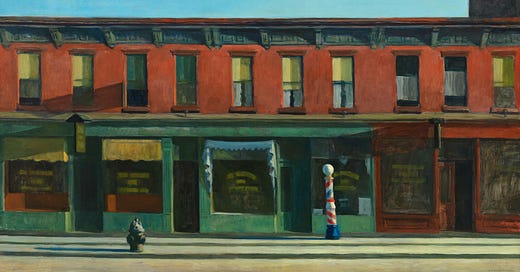Want to know why Republicans lose urban America?
Well maybe you do and maybe you don’t, but the editors of most prestige journalism outfits don’t care. This weekend the New York Times published yet another essay in a long line of hand-wringing about Democrats being out of touch with rural voters. entitled “Want to Know Why Democrats Lose Rural America?”
It is indeed true that Democrats do increasingly poorly in rural areas. Considering how crucial the rural vote is in many Senate races, Democrats truly do need to care about this if they want power. (I plan on writing on how this can be remedied going forward.) At the same time, however, many more Americans live in cities than in the country, and Republicans are doing worse there with little public discussion. In fact, the right has made attacking cities and city dwellers part of its schtick in ways that Democrats would never dream of directing at country folk. Obama got in trouble for his (largely true IMHO) comments about people “clinging to guns and religion,” but he crucially made those comments in private. Those comments were also meant to explain the situation with the rural voters instead of denigrating them. Republican politicians make a field day of shitting on coastal cities and Fox before the election was one big chorus of slandering cities and their inhabitants.
As someone who grew up in rural Nebraska but now works in New York City, I am deeply interested in this apparent discursive imbalance. Based on my personal experience, I also think I am especially qualified to understand why Democratic difficulties in rural areas are seen as a problem in the media and Republican ones in urban areas are not.
I see two phenomena at play here. The first has to do with long-held ideas about what it means to be “American,” and the second has to do with the wildly different expectations placed on the two major political parties.
As to the former, old mental habits die hard. When someone like Sarah Palin talked of her rural supporters as “real Americans” she was drawing on centuries of discourse from all over the political map. Some of America’s first men of letters like Thoreau and Emerson made their bones treating modern urban life with abhorrence. Countless books and films promoted the frontier myth, locating America’s true nature in western expansion and not the decadent eastern cities. When the Klan emerged in the 1920s as an above-ground, popular movement it contrasted the “100% American” small town world with urban spaces full of immigrants, Catholics and Jews. Beatniks like the protagonists of On the Road and hippies like the protagonists of Easy Rider went to “look for America” not in New York or Chicago but in the wide open rural spaces.
Modern prestige reporters, like most everyone else, have absorbed the assumption that ruralites are somehow more authentically “American” than those who live in cities. If you think about it for one minute, it’s pretty preposterous. When foreign tourists want to visit America they are coming to New York City, not an exurb in Tennessee. Those tourists would probably laugh at you if you told them they weren’t actually visiting “real America.” A Ford F-150 and a bodega are both quintessentially American in my book but not in the minds of most people living in this country, including its journalists.
This perception that ruralites are more American than city dwellers does actual political harm. Our system, through the Senate and the Electoral College, gives extra weight to rural voters, unbalancing our democracy. As long as those voters are perceived to be more “American” than the people whose voices are being pushed down there is little chance for change. In the Times article I mentioned before, the author castigates the Democrats for moving the Iowa caucuses out of the first position, as if it’s an injustice for rural white voters to NOT get special treatment.
Not only does the “real Americans” narrative still hold weight in prestige journalism, so does a very particular conception of the two parties. The Republican Party derives its power from a set ideology and “small tent” of committed foot-soldiers who maintain solidarity at all costs. As a comparison, Democrats STILL relitigate the 2016 primary, whereas Republicans went all in for Trump once he got the nomination and have barely budged despite his attempt to overthrow the government. The Republicans make no bones about the fact that they DO NOT intend to represent all Americans. In fact, that us versus them mentality is what gets them so many loyal voters in the first place.
Thus when the Republican Party intentionally alienates urban voters to score points with their base, the media just shrugs and says “well, what else do you expect.” The Democrats, on the other hand, are held to a different standard. They are still expected to be the “big tent” party that draws everyone in. Thus when they lose rural voters they are judged as failing in their mission.
The Democrats do indeed need to be a bigger tent party to win, and this will mean more compromises and internal conflicts. While Democrats must contend with these difficulties, the media overlooks the Republicans’ ideological extremity while giving them the halo of being made up of “real Americans.” No one asks why Republicans are losing urban America, party because the answer is so obvious, but mostly because the people who could be asking it just aren’t interested.




Well said, Jason. I feel all of this. I've had occasional conversations about this topic with my family.